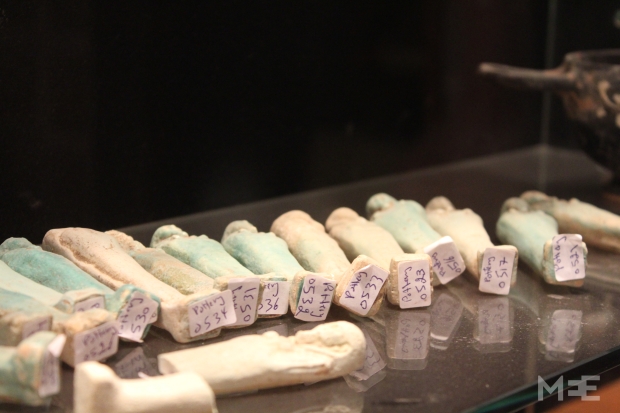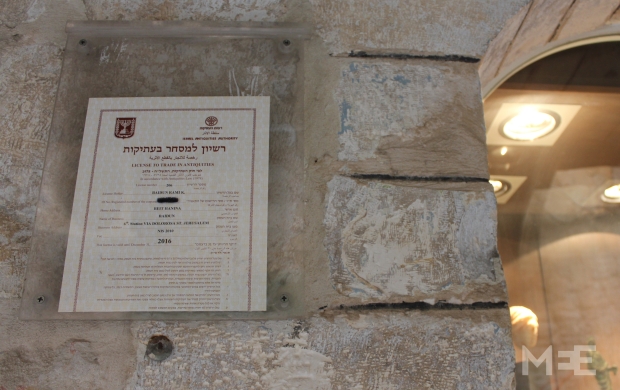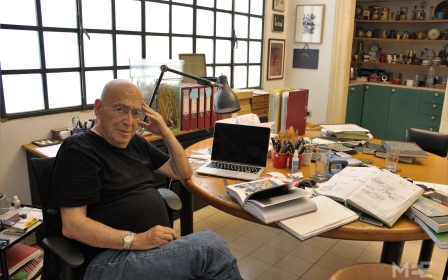Israel tries to stop historic trade being a relic of the past
JERUSALEM - It is hard to see any of the oil pots, Roman glass vials or Byzantine jewellery on the top floor of Nabeel al-Hroub’s Palestinian-owned antiquities shop in the Old City of Jerusalem. The lights are off and the shop floor, filled with glass cases containing numbered antiquities, is closed to customers.
“This is stealing my business,” al-Hroub said, switching on the light to reveal handwritten "Not for Sale" signs taped to the glass displays. Al-Hroub was referring to the 10 July raid on his shop in the Muslim Quarter of the Old City carried out by the Israel Antiquities Authority (IAA), which saw a number of items confiscated and forced him to stop selling his inventory of more than 15,000 antiquities.
The raid on Hroub’s shop is the latest example of the IAA’s efforts to clamp down on the trafficking of looted antiquities in the region. After legislation passed through the Israeli High Court in January, dealers were forced to comply with the IAA’s new computerised inventory system. In the months since, some dealers like Hroub have not complied with the IAA’s demands, rendering their former licenses to deal antiquities invalid.
Only in Israel and Occupied East Jerusalem
Israel is unique to the Middle East when it comes to antiquities dealing. It is the only country that maintains a legal antiquities trade for export, the roots of which began during Ottoman rule and continued to grow during the British Mandate. To battle a worsening problem of archaeological looting and antiquities trafficking, Israel passed the Antiquities Law of 1978, which deemed artefacts found after that date to be the property of the state. The Palestinian dealers who operated and continue to operate in the Old City of Jerusalem, which was occupied by Israel in 1967, are subject to this and other regulations put forth by the IAA.
'We know that there is a strong connection between the antiquities looting in Israel and the antiquities market'
Theoretically, after that date, new artefacts were not allowed to enter the market. But Dr Eitan Klein, a deputy in the IAA’s Robbery Prevention Division, says that the numbers prove otherwise, and that an outdated handwritten inventory system was ineffective in battling the sale of looted artefacts.
"We know that there is a strong connection between the antiquities looting in Israel and the antiquities market,” Klein said shortly after the raid on Haroub’s shop. “We know that many of the inventories of the dealers act as a laundry of antiquities that are from looting. They could sell an oil lamp, and then they could bring another oil lamp, a looted oil lamp, and put it in their inventory as if it was not sold. So in this way, they could launder stolen antiquities.”
Fifty-four dealers, including Palestinian residents of Jerusalem, Palestinian citizens of Israel and Jewish Israelis, currently hold antiquities dealing licenses in Israel. Since 1978, the state’s antiquities law has undergone few changes, and the regulation change passed in January modernised the handwritten inventory system into an online database, requiring the dealers to name, photograph, date and describe each of their artefacts. The IAA moved to enact the new regulation in 2012, but the legislation was delayed when a group of 15 dealers, including Hroub, petitioned against the change, ultimately losing their case at the end of 2015.
“Now the regulations regarding the computerised system say that every dealer in Israel, who wants to have a license in trading antiquities, has to put all of his inventory in this computerised system,” Klein said, noting that the online database helps dealers speed up the export licensing process when a sale is made. “The dealers needed to take photos of all the items, and to upload them, and also to write from where they are coming, from where they bought it, when, and eventually to whom they will sell it, when they sell it.”
Confiscated: $100m worth of antiquities
Though the IAA sees the new online database as key to trafficking prevention, other dealers regard the digitisation of their entire inventories as an insurmountable task. The IAA gave dealers three months from the January decision to comply with the new system. When Hroub was only able to upload a third of his 15,000-item stock within the three months, the license that his family has held for the better part of 40 years was not renewed.
Then came the raid.
Hroub said that on 10 July, a group from the IAA, along with armed border police, entered his shop and took approximately 100 boxes of antiquities from his store. Hroub was out of town that day, but when he returned, he estimated that the IAA confiscated upwards of $100 million of his inventory, without leaving any paperwork or records of what they took. Klein, who noted that dealers have known about plans to change the system since 2012, said he was unable to discuss individual cases because they are treated as "police investigations".
'I want them to give them back, because they are mine'
“I am doing it,” Hroub said, and noted his efforts to comply, stressing that the worst part of the process has been a lack of communication from the IAA. “I have more than 15,000 pieces. It takes time. I can’t work for 24 hours. I go to him, and talk to him to give me more than three months, and he did not agree. Nobody is talking to me about this.
“If they don’t like the gallery for [selling] antiques, come to buy everything and take it for the government if they want them and pay for it all. Not to steal this way. You know he has broken my life. I am not digging. I have all the receipts and I pay tax, and they know everything about that. I want them to give them back because they are mine.”
On the popular Via Dolorosa pilgrimage trail through the Old City, other dealers display their licences from the IAA outside of their shops. Rami Baidun, whose family owns three antiquities shops, said that his family was able to hire help and comply with the new regulations.
“For some antiquity dealers it did not work out because some have huge stock,” Baidun said. “I think the new way is more convenient, more traceable, personally I think it’s better. Others are not because they have some issues with the IAA, they did not know how to deal or upload the stock into the new system, did not hire professionals to help them out, and then they were stuck. The year 2016 is now getting close to 2017 and the Israel Antiquities Authority officials are doing their job.”
What about banning the trade completely?
Morag Kersel is an archaeologist who knows the Israeli antiquities trade from the inside out. Her research during the last 15 years has focused on all aspects of the country’s unique trade, from looting suppliers to pilgrims on the lookout for a Holy Land relic. An associate professor in the Department of Anthropology at DePaul University in Chicago, she is spending a portion of this summer in Jerusalem, continuing her research following the regulation changes.
“I set out to prove whether a legal market has stopped the looting,” Kersel said. “What I found was that I couldn’t make that correlation because the market is only quasi-legal. There are too many illegal elements in it to even consider it legal. There is illegal material entering that market all the time through this exchange of registered numbers and people I interviewed were very forthcoming about this.”
'There are too many illegal elements in it to even consider it legal'
With this sort of evidence, many archaeologists based in Israel are critical of the continuing trade, emphatic that the best way to stop the looting of antiquities is to stop the opportunity for sale altogether. This raises a key question: why doesn’t Israel do away with the trade altogether?
The answer is complicated by a number of factors, including historical precedent, existing license holders and keeping tourists happy, among others. Klein notes that completely abolishing the trade could be more effective, but also suggested that to put a moratorium on antiquities dealing would be undemocratic. “It is the topic of freedom of commerce and freedom of trade, so we [the IAA] need to stand with these basic rights.”
Kersel, who has also researched the activities of buyers and collectors, says she does not see the demand for Holy Land antiquities going away in the forseeable future.
“What I have realised in many of these conversations after all these years is that collecting is never going away, ever,” she said. ”I’m only speaking about Holy Land antiquities. Here, there is a certain aura that goes along with antiquities from the Holy Land, and people want a tangible piece of that. The bulk of the sales are people are spending 30, 40 dollars, maybe, and they are taking home their piece of the Holy Land. That’s not stopping. Pilgrims from all over the world, people visiting here for the first time. So what do we do?”
This is the question that the IAA is trying to answer by bringing the Israeli antiquities dealing tradition into the 21st century.
This article is available in French on Middle East Eye French edition.
New MEE newsletter: Jerusalem Dispatch
Sign up to get the latest insights and analysis on Israel-Palestine, alongside Turkey Unpacked and other MEE newsletters
Middle East Eye delivers independent and unrivalled coverage and analysis of the Middle East, North Africa and beyond. To learn more about republishing this content and the associated fees, please fill out this form. More about MEE can be found here.






